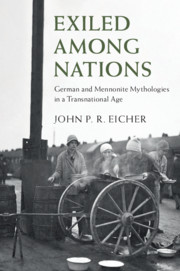Book contents
- Exiled Among Nations
- Publications of the German Historical Institute
- Exiled Among Nations
- Copyright page
- Dedication
- Contents
- Figures
- Maps
- Acknowledgments
- Abbreviations
- Introduction
- 1 No Lasting City (1870–1930)
- 2 A Sort of Homecoming (1929–1931)
- 3 Troubled Tribes in the Promised Land (1930–1939)
- 4 Mennonite (Di)Visions (1930–1939)
- 5 Peanuts for the Führer (1933–1939)
- 6 Centrifugal Fantasies, Centripetal Realities (1939–1945)
- Conclusion
- Bibliography
- Index
2 - A Sort of Homecoming (1929–1931)
Published online by Cambridge University Press: 01 December 2019
- Exiled Among Nations
- Publications of the German Historical Institute
- Exiled Among Nations
- Copyright page
- Dedication
- Contents
- Figures
- Maps
- Acknowledgments
- Abbreviations
- Introduction
- 1 No Lasting City (1870–1930)
- 2 A Sort of Homecoming (1929–1931)
- 3 Troubled Tribes in the Promised Land (1930–1939)
- 4 Mennonite (Di)Visions (1930–1939)
- 5 Peanuts for the Führer (1933–1939)
- 6 Centrifugal Fantasies, Centripetal Realities (1939–1945)
- Conclusion
- Bibliography
- Index
Summary
Chapter 2 examines the discourse between governments, aid agencies, and the press concerning the Mennonite refugees who fled from the Soviet Union to Paraguay via Germany and China between 1929 and 1931. Although the Soviet, German, and Canadian governments, the German press, and aid agencies in Germany and North America cast the situation as a refugee “problem,” this chapter contends that it gave each entity a valuable opportunity to assign broader meanings to the refugees, advance a range of agendas, and define their own constituencies along the lines of class, nationality, or religion. This chapter also shows that the refugees were aided and inhibited by their national, religious, and economic identifications, which left them with an ambiguous collective narrative about who they were as a group. Consequently, this chapter contends that outsiders’ interpretations provided the Fernheim Colony refugees with new ways to collectively understand themselves as heroes, victims, Mennonites, Germans, and Paraguayans.
Keywords
- Type
- Chapter
- Information
- Exiled Among NationsGerman and Mennonite Mythologies in a Transnational Age, pp. 84 - 127Publisher: Cambridge University PressPrint publication year: 2020

